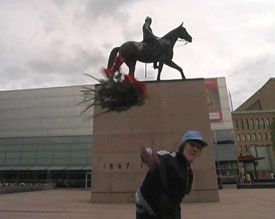This is an archive of the ArtCat Zine, 2007-2009. Please visit our new project, IDIOM.
Optical Drama and Residual Modernities at Americas Society

It is perhaps telling, if not yet wildly significant, that Ranciere begins his essay, ‘The Future of the Image,’ by analyzing the opening of Bresson’s Au hasard Balthazar, and does so in contrast, furthermore, to a French game show. The comparison is between two images, plain and simple; marking our arrival at the moment when what formerly required qualification as a movement-image, say, or a time-image, has become simply 'image.' Moving images, in short, have become the norm. At first glance this is merely a further example of the Rancierian move par excellance: the repositioning of the radical or the disruptive as definitive - thus all politics is radical politics, all art the ‘redistribution of the sensible,’ and so on. Yet he proceeds to lay out an entire taxonomy of ‘image-ness,’ setting aside no special distinction for the moving image beyond, perhaps, implicitly setting the criteria by which all images are, henceforth, to be judged.
This splitting of the moving image into types, first from television, and then later from within cinema itself, recalls Deleuze’s desire to distinguish between the aforementioned time- and movement-images. Both philosophers wish to carve out, rescue even, from within moving images as such, something like the arrival of a redemptive, abstract, Modernist cinema; a cinema capable of a certain sort of resistance. And this effort stands in striking contrast to those many thinkers for whom cinema is capitulation itself; to mass culture, to passive spectator-ship, to an altogether impoverished form of representation, etc.
Thus the question – what is the horizon of the moving-image? What sort of modernity is permissible under its rule? Tuesday, Mauricio Dias, Walter Riedweg, Beatriz Jaguaribe, John Hanhardt, Gabriela Rangel, and Heike Arzápalo will discuss the relationship between moving images and discourses of the modern at the Americas Society. The panel begins at 6:30.
ZINE
HOME
TIPS / COMMENTS
CATEGORIES
CONTRIBUTORS
- Greg Afinogenov
- B. Blagojevic
- Adda Birnir
- Susannah Edelbaum
- Julie Fishkin
- Paddy Johnson
- Jessica Loudis
- Christopher Reiger
- Andrew Robinson
- Peter J. Russo
- Blythe Sheldon
- S.C.Squibb
- Hrag Vartanian
